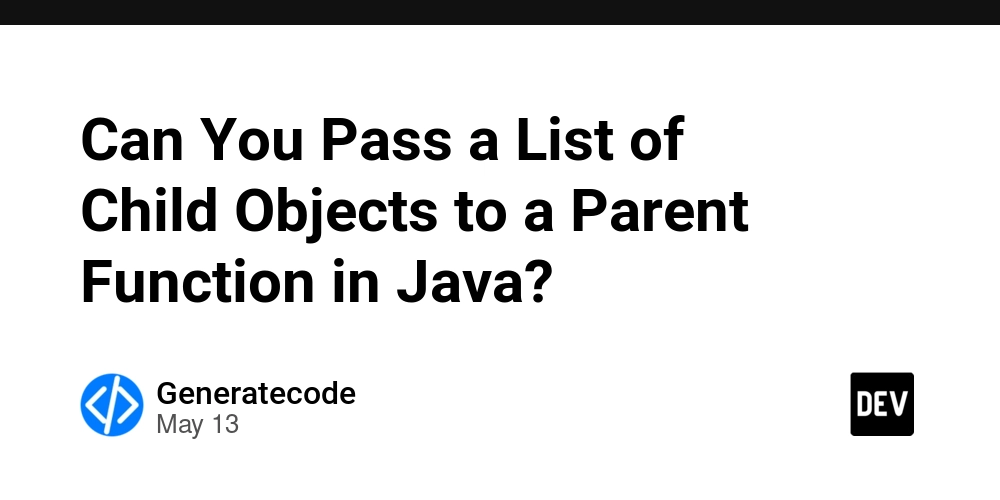Can You Pass a List of Child Objects to a Parent Function in Java?
When working with object-oriented programming in Java, it's common to encounter situations where you want to pass a collection of objects from a subclass (child) to a method that expects a collection of objects from a superclass (parent). This might seem straightforward, but the compilation error you're facing highlights a key aspect of Java's type system, particularly with generics. Understanding Java Generics Generics in Java provide a way to specify a type parameter when defining classes and methods. When you declare a method that takes a list of a specific type, such as List, it expects a list that strictly contains Parent objects, not Child objects. Even though Child is a subclass of Parent, List is not considered a subtype of List. This is due to Java's type safety and generics implementation, which prevents potential runtime errors. Why the Compilation Error Occurs The error you're seeing: The method processParentList(List) in the type Main is not applicable for the arguments (List) This message indicates that Java's type checking mechanism doesn't allow passing a List to a method that expects a List. The fundamental rule of generics is that List is not a subtype of List even if A is a subtype of B. Therefore, a List cannot be passed in place of List. Solutions to Pass a List of Child Objects To effectively pass a list of child objects to a method that expects a list of parent objects, you can utilize a few different approaches: 1. Use Wildcards You can leverage Java's wildcard capabilities to allow for flexible type handling. Here’s how you can modify your processParentList method to accept a list of any subtype of Parent: import java.util.ArrayList; import java.util.List; class Parent {} class Child extends Parent {} public class Main { public static void main(String[] args) { List childList = new ArrayList(); childList.add(new Child()); childList.add(new Child()); processParentList(childList); // Now this works } // Using a wildcard to accept any List of Parents public static void processParentList(List

When working with object-oriented programming in Java, it's common to encounter situations where you want to pass a collection of objects from a subclass (child) to a method that expects a collection of objects from a superclass (parent). This might seem straightforward, but the compilation error you're facing highlights a key aspect of Java's type system, particularly with generics.
Understanding Java Generics
Generics in Java provide a way to specify a type parameter when defining classes and methods. When you declare a method that takes a list of a specific type, such as List, it expects a list that strictly contains Parent objects, not Child objects. Even though Child is a subclass of Parent, List is not considered a subtype of List. This is due to Java's type safety and generics implementation, which prevents potential runtime errors.
Why the Compilation Error Occurs
The error you're seeing:
The method processParentList(List) in the type Main is not applicable for the arguments (List)
This message indicates that Java's type checking mechanism doesn't allow passing a List to a method that expects a List. The fundamental rule of generics is that List is not a subtype of List even if A is a subtype of B. Therefore, a List cannot be passed in place of List.
Solutions to Pass a List of Child Objects
To effectively pass a list of child objects to a method that expects a list of parent objects, you can utilize a few different approaches:
1. Use Wildcards
You can leverage Java's wildcard capabilities to allow for flexible type handling. Here’s how you can modify your processParentList method to accept a list of any subtype of Parent:
import java.util.ArrayList;
import java.util.List;
class Parent {}
class Child extends Parent {}
public class Main {
public static void main(String[] args) {
List childList = new ArrayList<>();
childList.add(new Child());
childList.add(new Child());
processParentList(childList); // Now this works
}
// Using a wildcard to accept any List of Parents
public static void processParentList(List parentList) {
for (Parent parent : parentList) {
System.out.println("Processing parent object: " + parent.getClass().getName());
}
}
}
In this modified version, processParentList now accepts List, which means it can take a list of any class that extends Parent, including Child.
2. Convert the List
If for some reason you cannot modify the method signature, another way to ensure compatibility is by creating a new list of Parent that you populate with the Child objects. Here’s how you can do that:
import java.util.ArrayList;
import java.util.List;
class Parent {}
class Child extends Parent {}
public class Main {
public static void main(String[] args) {
List childList = new ArrayList<>();
childList.add(new Child());
childList.add(new Child());
List parentList = new ArrayList<>(childList); // Creating a new List
processParentList(parentList);
}
public static void processParentList(List parentList) {
for (Parent parent : parentList) {
System.out.println("Processing parent object: " + parent.getClass().getName());
}
}
}
Conclusion
In conclusion, while Java's generics may seem restrictive, they are designed to enforce type safety. By utilizing wildcards or converting your list into the expected type, you can successfully pass a list of child objects to a function that expects a parent list. This ensures that your code remains type-safe while allowing flexibility in object-oriented programming.
Frequently Asked Questions
Can I use wildcards with bounded types in Java?
Yes, wildcards allow you to specify bounds using the syntax ? extends T or ? super T to define upper or lower bounds on the generics you are working with.
Are there any performance implications when using wildcards?
Using wildcards can introduce slight overhead due to type checking during runtime. However, this is often negligible compared to the benefits of type safety and flexibility in the design of your API.
How do I handle generic types with multiple levels of inheritance?
You can use wildcards for multiple levels of inheritance as long as you follow the object-oriented principles and ensure type safety by adhering to the superclass and subclass relationships.














































































































































































![[The AI Show Episode 156]: AI Answers - Data Privacy, AI Roadmaps, Regulated Industries, Selling AI to the C-Suite & Change Management](https://www.marketingaiinstitute.com/hubfs/ep%20156%20cover.png)
![[The AI Show Episode 155]: The New Jobs AI Will Create, Amazon CEO: AI Will Cut Jobs, Your Brain on ChatGPT, Possible OpenAI-Microsoft Breakup & Veo 3 IP Issues](https://www.marketingaiinstitute.com/hubfs/ep%20155%20cover.png)

























































































































![Rust VS Go VS TypeScript – which back end language is for you? With Tai Groot [Podcast #176]](https://cdn.hashnode.com/res/hashnode/image/upload/v1750974265013/73f79068-0087-4c39-8a8b-feea8cac873b.png?#)
















































































































.jpg?width=1920&height=1920&fit=bounds&quality=70&format=jpg&auto=webp#)



















































































































































































































